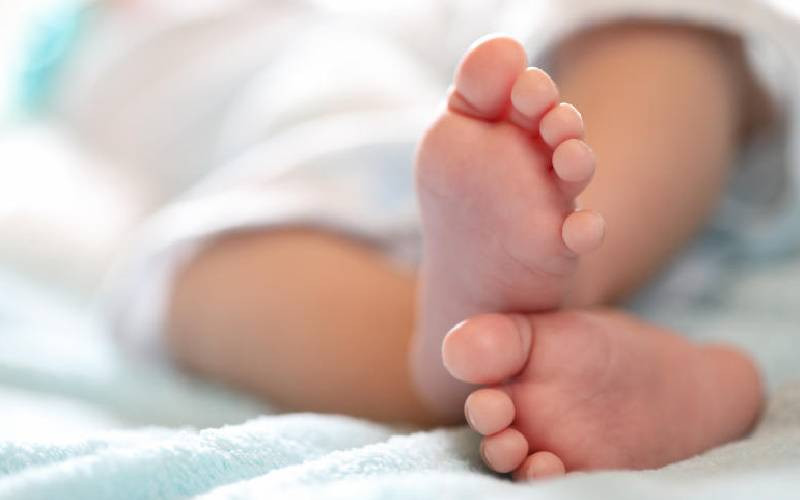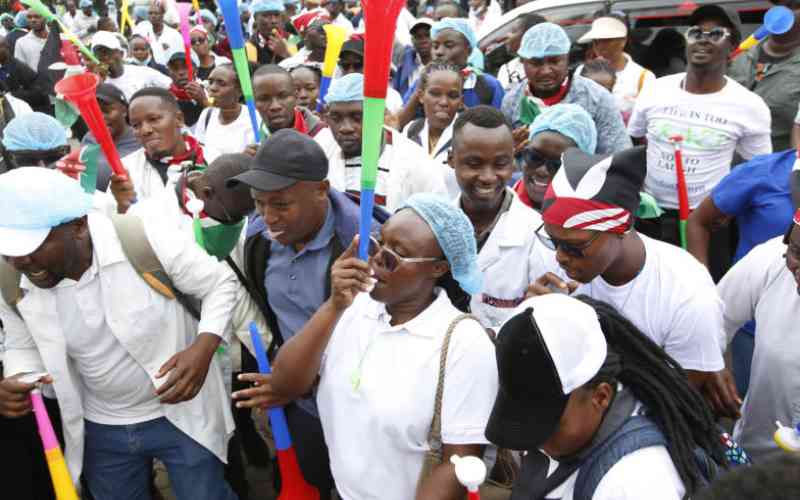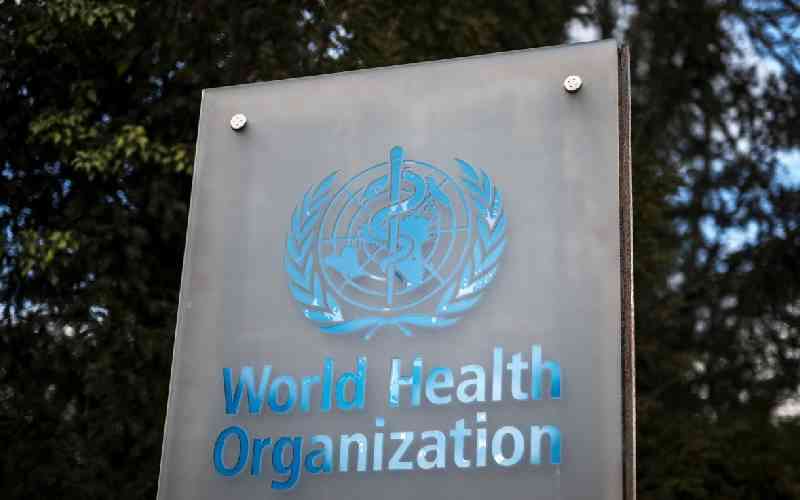
The birth of David (not his real name) was regarded as an evil omen. Aged barely three weeks old, his mother shoved him into a dusty sack of iron nails and dumped him at a construction site at Marereni village in Kilifi, leaving him to the elements.
The reasons for his mother's decision to shove him inside the sack are a subject of conjecture. Maybe she left him behind to suffocate or to be rescued by a well-wisher. David was born intersex in 2021.
According to Mzee Tsuma Nzai, a Kaya elder and custodian of the Mijikenda traditions at Magarini Cultural Centre, intersex children are considered a 'kijego' meaning a curse in the populous community of the Coast.
However, David's grandmother (name withheld), said a well-wisher found him at the construction site and took him to her.
"He is a miracle baby. When he was brought to me he had a sparkle in his eyes, and I knew, this child would be special," said the grandmother, adding that David's mother has never returned home.
Mzee Nzai believes David's mother had a good reason to run away. As per the Mijikenda tradition, she was to be forced to drown the baby to avert "an impending calamity" for the villagers.
He said the babies are often seen as a sign of looming danger and poverty or ukiya in their homestead. In the past, said Nzai, intersex babies were drowned to avert the looming curse.
- Support intersex children, parents told
Keep Reading
"A big hole is dug under a baobab tree and the baby is put inside then the mother is forced to fill it with water. Once the baby is submerged completely in water he is left to die," said Nzai.
Although these archaic traditions are not widely practised now at the Coast, Nzai admitted that in remote villages killing of intersex, microcephalus and albino babies is still prevalent.
The threat to the lives of intersex babies is not unique to Coast. A study by Disability Rights International (DRI) reveals that 45 per cent of mothers of intersex babies face similar pressure to end their lives.
However, the survey found that the situation was worse in the rural areas of Kilifi County, where two in every eight mothers of intersex babies are pressured to kill them.
According to the 2019 Kenya National Population and Housing Census Data, Kenya is home to 1,524 intersex persons, with the coast region having 86, and Kilifi County leading with 25.
However, human rights activists say that being a silent topic, communities in Kenya distance themselves from intersex children as they believe is a curse and a bad omen to society.
According to Kenya Legal Ethical Issues Network (KELIN), children born with visible variations in their sexual organs often undergo painful and irreversible surgeries to give them an identity to save their lives.
KELIN said there is no law in Kenya that prohibits these surgeries for intersex children too young to consent, leaving the question of what is deemed surgically necessary to be decided by medical professionals.
"Most medical experts continue to characterise intersex body traits as disorders," says Sostine Lewa, 32, who underwent excruciating surgery to rectify the "disorder" shortly after her birth.
In an interview, Ms Lewa said she underwent genital surgery to assign her gender by the time she turned one year old, but that did not help her emotionally as her peers ridiculed her.
"This filled my childhood memories with confusion as I felt different from girls my age as I grew up in Chasimba village in Kilifi County," she says.
Ms Lewa was born intersex. Shortly after her birth, her parents and doctors decided to assign her the female gender. As part of this decision, her male reproductive organs were surgically removed to establish her gender identity.
However, Ms Lewa desires that her genitals should have remained intact until she is old enough to give consent for surgery. In her words, she was robbed of the right to make the biggest decision of her life.
"My parents wanted a girl because they had five boys and three girls. They did not disclose information about my sex, and I was raised as a girl," she said.
While growing up as a girl, Ms Lewa felt different from her peers. She never menstruated, and the absence of her mother since the age of three left her without someone to share her experiences.
"I was labelled a girl. I wanted to be a girl and fit in, but it wasn't easy. I played with boys and got along well with them.
"My niece used to ask me, 'Auntie, teach me how to wear a sanitary pad and I kept wondering because I didn't even know what sanitary pads were since I never experienced menstruation," she said.
Ms Lewa discovered she was intersex during an awareness conference in Mombasa at the age of 27, adding that the revelation came to her as a breakthrough because she struggled to fit in for many years.
After the conference, she returned home stressed and confused. Ms Lewa called for an emergency family meeting and asked her father to reveal the truth about her childhood surgery.
"I confronted my father to confirm. He cried on that particular day, and he confirmed to me that I was born intersex, but because they saw it as a curse, they opted for the corrective surgery," she said.
Ms Lewa now feels that her parents deprived her of a lifetime opportunity by choosing her gender instead of letting things unfold naturally.
She is now a member of the Intersex Rights Initiative Coast, a new organisation focused on creating awareness about intersex people. She hopes that society will understand and accept intersex persons.
Lenox Taura, a nurse at Kilifi Referral Hospital, said that parents who give birth to intersex children should not gender reassign them when they are still young.
"Parents must be patient as the strongest hormones are allowed to generate their gender features and organs while the weaker hormones are killed," said Taura.
He advised mothers to attend antenatal care to discover such anomalies earlier, adding that an intersex baby can be treated when discovered early while the foetus is in the womb.
Hannel Chivatsi, director of Intersex Rights Initiative Coast (IRIC), said she came up with the initiative to deal with the challenges of intersex people.
IRIC seeks to create a self-sustaining generation of intersex communities and arrest any form of discrimination. Chivatsi intersex people and their families should be supported with resources.
Ms Dorcas Gitonga, Sexual and Reproductive Health Rights (SRHR) programme officer, and a psychologist at KELIN, said genital assignment comes with challenges and harm.
"There could be sterilisation of the body and blockage of the reproductive system. There could be traps of wrong sex on the body. An assigned genital may not conform to the body," she said.
Added Ms Gitonga: "It's advised that such surgeries be postponed until the individual is old enough to consent. Parents raise intersex children with a heavy burden."
Ms Riziki Thoya first gazed at her newborn in the delivery room, then looked at her husband and nurses at Marereni Hospital and how ultrasounds could get the sex of the child wrong.
She knew the situation was more serious than a mix-up after the husband and nurses went pin drop silent.
"It went from very celebratory, very exciting, to very scary," said Kahindi, adding that after her husband learned their bundle of joy was intersex, he abandoned them at the hospital.
To help support parents with disabled children including intersex, an association called Amani Mwangatini Disability Caretaker self-help group was formed.
Pastor Simon Kenga, co-founder of Amani Mwangatini disability caretaker self-help group, has so far registered 31 disabled children whom they take care of and create awareness.
He adds that the majority of the abandoned mothers are poor with no jobs to fetch an income. They are raising their children single-handedly.
"We have over 100 members, and many are women with children with disabilities. Most of them have been abandoned by their husbands," said Simon.
"Boys and girls with disabilities in Kilifi are invisible in government statistics, unable to access health services, discriminated against by society, and trapped in a cycle of poverty and violence," Simon says.
Ms Agness Karembo, Chief Officer in charge of Gender at Kilifi County Government, said human rights violations of intersex people include unnecessary surgeries and other invasive treatment.
"These surgeries of intersex babies and children without consent have been condemned as harmful practices and ill-treatment by United Nations bodies," said Ms Karembo.
This story was made possible with the support of the UZIMA-DS project, funded by the National Institutes of Health (NIH).
 The Standard Group Plc is a multi-media organization with investments in media
platforms spanning newspaper print
operations, television, radio broadcasting, digital and online services. The
Standard Group is recognized as a
leading multi-media house in Kenya with a key influence in matters of national
and international interest.
The Standard Group Plc is a multi-media organization with investments in media
platforms spanning newspaper print
operations, television, radio broadcasting, digital and online services. The
Standard Group is recognized as a
leading multi-media house in Kenya with a key influence in matters of national
and international interest.











